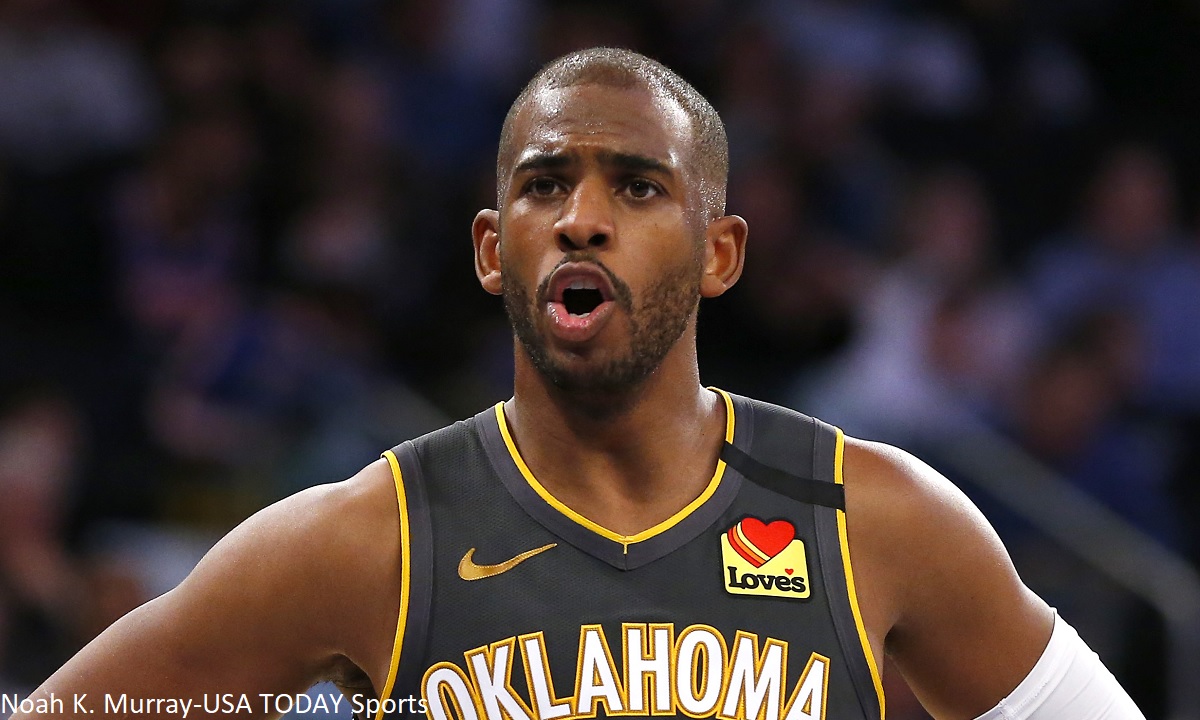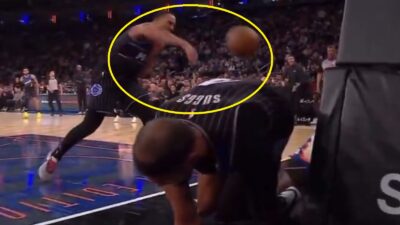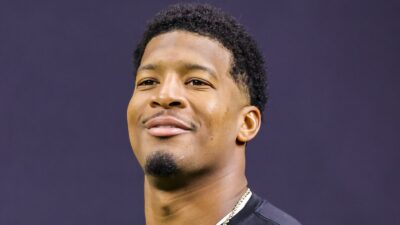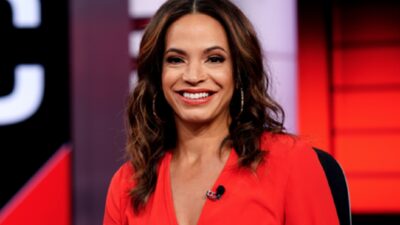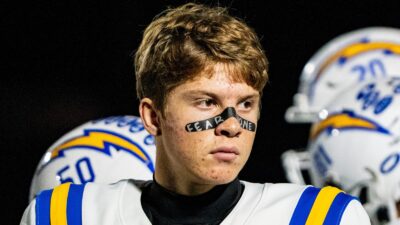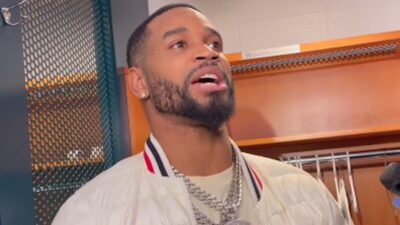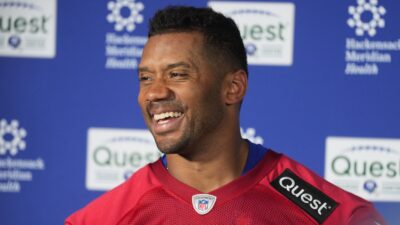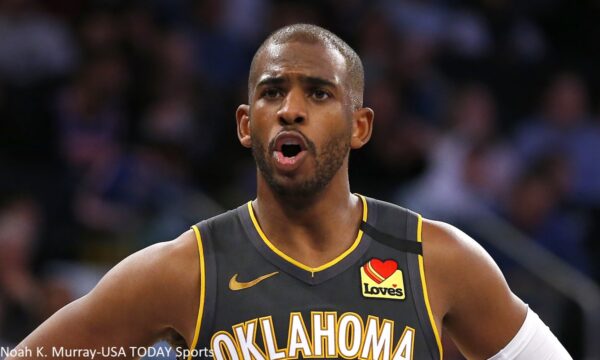
When the clock struck zero in Game 7 of the Oklahoma City Thunder-Houston Rockets series, no one was in more agony than Chris Paul. Throughout the series, Paul’s leadership was a constant topic of discussion. The discussions all mirrored a similar sentiment about how impressive Paul’s “comeback season” was and how the Thunder defied the infamous preseason projections that gave them just a 0.2 percent chance to make the playoffs. For the NBA community, pushing the Rockets to a nail-biting Game 7 was reason enough to celebrate for the overperforming Thunder. For Paul, however, there was only agony.
Here we will examine how the Thunder went from a team few expected to succeed this season to one that surpasses nearly all expectations.
Paul’s road to Oklahoma City
The last person to realize an NBA superstar has lost a step is usually the superstar himself. One does not become an elite-level NBA player without possessing an inordinate amount of self-confidence. Watching a once-great player struggle to make routine plays that, at one point, they could make in their sleep, is one of the true evils of sports. The media often has a tendency to prematurely pronounce these declines. And when a player of Paul’s caliber catches wind of their projected demise, you can all but guarantee something historic is going to happen.
While there is no denying that Paul’s 2018-19 campaign did not live up to the lofty Hall-of-Fame standards he expects of himself, it was still evident that he was capable of playing elite basketball.
In the 727 minutes Chris Paul played without James Harden last season, Paul averaged 22.5 points, 12.5 assists, and 5.4 rebounds on a 58.1 TS% per 36 minutes. Rockets had a +10.4 Net Rating in those minutes.
— Justin Russo (@FlyByKnite) July 12, 2019
Paul and Harden struggled to share the court together, as Harden’s refusal to make any kind of off-ball movements forced Paul to attempt to orchestrate the offense at a disadvantage, essentially playing four-on-five. Paul’s numbers when Harden sat revealed he was still the “Point God.” With uncertainty surrounding Paul’s future, Thunder’s general manager Sam Presti accepted a deal in which Houston mortgaged their future in draft picks to exchange Paul for Russell Westbrook.
Entering this season, no one expected Paul to stick around Oklahoma City for long. After an offseason spent acquiring a bevy of future first-round picks and other assets, the Thunder seemed content to tear down the legacy Westbrook left and start anew. But with the outside world frantically projecting his next destination, Paul wholeheartedly bought into his role as the Thunder’s leader. Basketball teams have the tendency to take on the persona of their best player, making it no surprise that this Thunder team eventually adopted a fearless intensity reflective of their six-foot point guard.
As an undersized guard in a game dominated by much larger athletic marvels, Paul has always played with a chip on his shoulder. That chip was never more evident than this season. The way Paul demands perfection out of his teammates turned his reputation into a guy that other players would not want to play with; his disagreements with Harden are the prime reason he found himself in Oklahoma City in the first place. However, unlike his last year in Houston, Paul’s teammates with the Thunder welcomed this approach.
The three point guards
Standout second-year guard Shai Gilgeous-Alexander was a sponge absorbing the countless pieces of advice and tips on the subtleties of the game that Paul has accrued over 15 seasons in the NBA. Gilgeous-Alexander is excellent at getting to his spots as he seems to slither through the smallest openings in the defense. He nearly doubled his points per game average, from 10.8 his rookie year to 19.0 this season. Paul trusted Gilgeous-Alexander to deliver no matter the moment, like when he kicked it out to Gilgeous-Alexander for this season-saving shot down 2-0 in Game 3.
Oklahoma City’s three-headed monster at point guard came up huge tonight.
Dennis Schroeder
▫️29 PTS | 5 AST | 5 REBChris Paul
▫️26 PTS | 6 REB | 5 ASTShai Gilgeous-Alexander
▫️23 PTS | 7 REB | 6 ASTpic.twitter.com/vh67hc4of0— ProCity Hoops (@ProCityHoops) August 23, 2020
Dennis Schroder redefined his reputation in the league from an undersized scoring guard with a penchant for taking head-scratching shots, to a spark plug Sixth Man of the Year candidate. Schroder and Paul’s partnership was the perfect intersection of chaos and order.
Schroder took smarter attempts than ever before, en route to his career-high 46.9 percent field goal shooting. He also set a personal high from deep, connecting on 38.5 percent of his triples, a significant improvement for the 33.7 percent career three-point shooter. Paul helped Schroder leverage his quickness and soft touch on pull-up jumpers into smart shots. In return, Schroder was entrusted to run the Thunder’s offense when Paul rested. Paul was more than willing to let Schroder or Gilgeous-Alexander take over primary ball-handling duties depending on who had the hot hand or a favorable defensive matchup.
Head coach Billy Donovan’s willingness to play all three point guards together was paramount in forming the five-man lineup with the highest net-rating in the NBA. When Paul, Schroder, and Gilgeous-Alexander shared the floor with Steven Adams and Danilo Gallinari, the Thunder outscored their opponents by a staggering 29.9 points per 100 per possessions – by far the best mark in the league.
However, Paul’s greatest accomplishment as a mentor this season arguably came with undrafted rookie, Luguentz Dort. Defensively, Dort needed no encouraging. His menacing brand of defense helped frustrate Harden all series long. But on the offensive end of the court, Dort struggled to attack a Houston defense that was content to let him fire at will. After going 3-for-16 from the field and 0-for-9 from deep in Oklahoma City’s 34-point Game 5 defeat, it was Paul who encouraged Dort to stay aggressive. Despite bricking three after three, Paul’s faith in Dort never wavered. And in Game 7, Dort delivered.
Lu Dort making history tonight.
Most points in a Game 7 before turning 22:
30 — Lu Dort tonight
27 — LeBron James
25 — Kobe BryantMost points in a Game 7 by a rookie:
37 — Tom Heinsohn
32 — Tom Meschery
30 — Lu Dort tonight pic.twitter.com/TH8wlOQZkU— StatMuse (@statmuse) September 3, 2020
The moment of belief
Months before the Thunder, a team of players scraped together to amass future assets, pushed the alleged championship-contending Rockets to the brink in Game 7, there was a moment that foreshadowed Oklahoma City’s potential. Thanksgiving is frequently highlighted as the turning point of their season. The Thunder held the third-best record in the NBA from Thanksgiving on, but the moment that truly sparked their belief as a team occurred about two weeks later in a seemingly ordinary NBA regular-season game.
The Thunder entered their Dec. 16 matchup with the Chicago Bulls following two straight losses, dropping their record to 11-14 at the time. Oklahoma City opened the game as the favorite but fell behind by as many as 26 points. With the Thunder trailing midway through the fourth quarter, Paul delivered a captivating performance that established a new precedent for late-game play in Oklahoma City.
Chris Paul (30 PTS, 10 REB, 8 AST) played out of his mind in a big comeback win against the Bulls#ThunderUp pic.twitter.com/Lb8vKnEHrr
— Def Pen Hoops (@DefPenHoops) December 17, 2019
Paul made five straight threes in the quarter as he relished every opportunity he was afforded to isolate and shoot over the Bulls’ bigs. A player making a high volume of threes is not uncommon in today’s NBA, but this game held a deeper meaning for the Thunder. Paul’s performance solidified to Oklahoma City’s young players that there was no moment he hadn’t seen or that he wasn’t prepared for. The Thunder followed their win against the Bulls with another 20-point comeback victory against the Grizzlies in their next game. This kicked off a stretch of nine victories in ten games and culminated in the Thunder developing the formula for the most lethal late-game offense in the league this season.
Late-game heroics
The Thunder were the best clutch team in the NBA, as they won the most games in the league in which the final score was decided by fewer than five points. A historic 68 percent of their wins came in clutch scenarios. No team has ever relied more on pulling wins out of a magic hat, but then again, no one has ever had a magician quite like Paul.
Paul led the NBA with 150 clutch points this season (final five minutes of a game with a point differential of five or fewer), and he did it on an ultra-efficient 52-37-92 shooting splits. When the Thunder needed a bucket, the ball usually started CP3’s hands. What makes him so difficult to defend is his ability and willingness to always hit the open man and make the right basketball play. Both Gilgeous-Alexander and Gallinari also finished inside the top 20 in clutch scoring this year, with Gilgeous-Alexander converting on 58 percent of his clutch attempts and Gallinari knocking down the same number of clutch threes as long-range marksmen Damian Lillard and Trae Young.
However, in their Game 7 defeat, it was Paul’s desire to always make the right play that cost Oklahoma City. The Thunder were in an ideal position, as they trailed the Rockets by one with fewer than 30 seconds to play. Houston refused to let Paul beat them again and sent a double team his way. After his pass to the open Gilgeous-Alexander was deflected, chaos ensued. In a season where he delivered countless ice-cold buckets, the ball never found its way back into Paul’s hands.
The next chapter
While the ending to the Thunder’s journey this season could not have come in a more disappointing fashion, there is nothing but optimism in Oklahoma City. Despite many expecting Presti to sell high on the players that made this season possible, the Thunder should not dismiss their current core to rush into a rebuild. This Thunder team won the same number of playoff games that Paul George and Russell Westbrook won in two years together. Chemistry like Oklahoma City’s can take years to develop, and there are no sure things in the NBA.
Paul’s eventual departure may be inevitable. His trade value remains complicated given his age and contract, but his impact is clear. Paul is the rare kind of player who can take a good team and turn them into a championship-caliber team. Expect a number of the contenders that fall short this postseason to give him serious consideration this summer.
Regardless of which city he calls home next season, Chris Paul and the Thunder delivered a season that no one thought WAS possible, and one that won’t be forgotten anytime soon.
Jack Reining covers the NBA for Larry Brown Sports. You can follow him on Twitter @JackReining3

